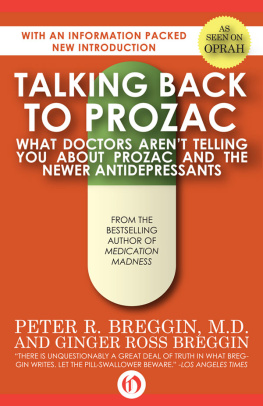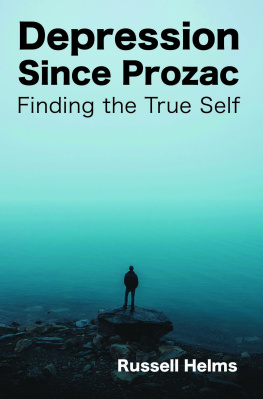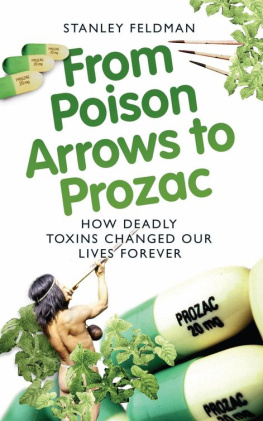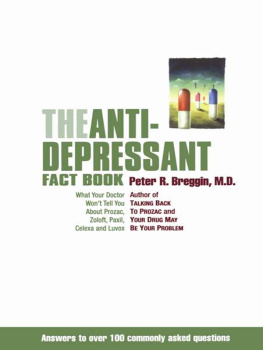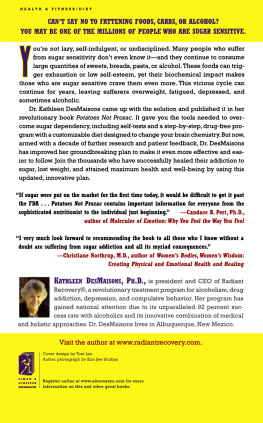Talking Back to Prozac
What Doctor Wont Tell You About Today's Most Controversial Drug
Peter R. Breggin, M.D. and Ginger Ross Breggin

To Phil and Jean Ross,
Our Loving Parents
Acknowledgments
Our assistant, Melissa Magruder, has been indispensable in copyediting and maintaining and retrieving the complex materials required for the completion of this book and in handling innumerable daily activities around the office. She has made this project run smoothly. Chad Alden joined us as an intern at precisely the moment we needed research assistance and we appreciate his generous help.
We are grateful to our friends who read portions of the manuscript, especially Kevin McCready and David Cohen, who reviewed it cover to cover, and offered many valuable suggestions. Helpful comments were made by Robert Grimm on neurological aspects and David Whitford on statistical issues. We also thank Paul Sleven for his untiring, admirable legal vetting. We, of course, remain wholly and exclusively responsible for the final product.
We wish to thank the more than one hundred members of the Board of Directors and the Advisory Council of the Center for the Study of Psychiatry. Founded more than twenty years ago by Peter Breggin, this network of medical and mental health professionals, attorneys, patient advocates, and members of Congress continues to provide enormous moral and professional support. More than two dozen board and advisory council members are psychiatrists, and another dozen are drawn from other medical specialties, including internal medicine, neurology, and pediatrics. We especially wish to acknowledge John George and Michael Valentine, co-directors of the Center's new membership division, Children First!
We are grateful for the mutual support we have shared with groups and individuals who identify themselves as survivors of psychiatry and psychiatric drugs. In areas related to this book, we have worked particularly closely with Guy McConnell, national director of the Prozac Survivors Support Group, Inc., and state directors Bonnie Leitsch (Kentucky), Ann Tracy (Utah), and Dwight Harlor III (Ohio).
This is the third book of ours published by St. Martin's Press, the first two being Toxic Psychiatry (1991) and Beyond Conflict (1992) by Peter Breggin. It will be followed by a fourth, The War Against Children (fall 1994), coauthored by Peter and Ginger Breggin. Barbara Anderson is the very competent, congenial editor of this book and we look forward to a long relationship with her.
Our agent, Richard Curtis, supported us from the beginning when it was as yet difficult to get published. Richard, thanks for your continued help!
This book is co-created, but Peter Breggin did the actual writing, and he alone is responsible for any observations or opinions on medicine, psychiatry, the FDA, psychiatric drugs, and pharmaceutical company practices. Ginger Breggin provided important concepts and directions, edited the entire manuscript several times, and organized and supervised the vast amount of activity required to develop the research and background material, to maintain the files, and to work with resource persons.
The awkward problem of how to refer to the authors in the text has been resolved by using "I" to refer to Peter Breggin, since it is to his activities as a physician and psychiatrist that the text most frequently refers. The word "we" will be used to designate both authors. Ginger Breggin will be referred to by name when describing her specific activities.
Acronyms of Organizations
AAAS American Association for the Advancement of Science
ADAMHA Alcohol, Drug Abuse, and Mental Health Administration (now absorbed into NIH)
AMAAmerican Medical Association
APAAmerican Psychiatric Association or American Psychological Association
CH.A.D.D.Children with Attention-Deficit Disorders
DHHSDepartment of Health and Human Services (includes the FDA, the NIH, and the CDC)
FAESFoundation for Advanced Education in the Sciences
FDAFood and Drug Administration
GAO-U.S. General Accounting Office
HHS-same as DHHS
NAMINational Alliance for the Mentally 111
NASNational Academy of Sciences (also see NRC)
NIHNational Institutes of Health
NIAANational Institute of Alcoholism and Alcohol Abuse (formerly part of ADAMHA; now part of the NIH)
NIDA National Institute of Drug Abuse (formerly part of ADAMHA; now part of the NIH)
NIMH National Institute of Mental Health (formerly part of ADAMHA; now part of the NIH)
NRCNational Research Council (part of NAS)
NSFNational Science Foundation
PHS-U.S. Public Health Service
How to Use This Book
First, an important warning:
When trying to withdraw from many psychiatric drugs, patients can develop serious and even life-threatening emotional and physical reactions. In short, it is dangerous not only to start taking psychiatric drugs but also can be hazardous to stop taking them. Therefore, withdrawal from psychiatric drugs should be done under medical and clinical supervision.
Most books about psychiatric drugs provide the kind of information that drug advocates and pharmaceutical companies want the public to have. At best, they offer a watered-down version of information that is at the fingertips of most physicians and other professionals.
This book is different. It provides information not readily available, even to most experts in the field. Much of it, in fact, has been systematically withheld from physicians and patients alike. Nonetheless, this book cannot be used as a treatment handbook. We suggest instead that you share it with your personal physician or mental health professional. Almost certainly, he or she will be unfamiliar with some if not much of what it contains.
We have provided an extensive bibliography that lists every author, article, or project mentioned in the book. If the reference cannot be located easily by the name of the author, the numbered chapter note will help you find the source in the bibliography. The appendix to the book contains information on psychiatric reform organizations, self-help support groups, therapy resources, legal resources, and standard sources of drug information.
In most cases we have provided identifying information about the professionals whose work we cite in the book. Psychiatrists are physicians; they have medical degrees. As medical doctors, they have the right to prescribe medications. Some psychiatrists are also trained in psychotherapy or "talking therapy," but many of them lack these skills. While psychiatrists take leadership roles in promoting psychiatric drugs, many family physicians and other medical specialists also prescribe these medications. Psychologists are trained in a variety of disciplines, including research, psychological testing, and psychotherapy. They have Ph.D., rather than M.D., degrees and cannot prescribe medications.
Many biologically oriented psychiatrists argue that medication is the best or only approach to the problems they diagnose and treat, but there is a great diversity of opinion about this in the field of mental health and within the public. While some psychologists are lobbying for the right to prescribe medication, they have not as yet obtained this dubious power. Like many mental health professionals, however, some psychologists support the pharmacological approach that we criticize, while many others do not. In seeking help from mental health professionalsincluding psychiatrists, psychologists, clinical social workers, counselors, and family therapistsit is best to inquire in advance about their views on psychiatric drugs.

